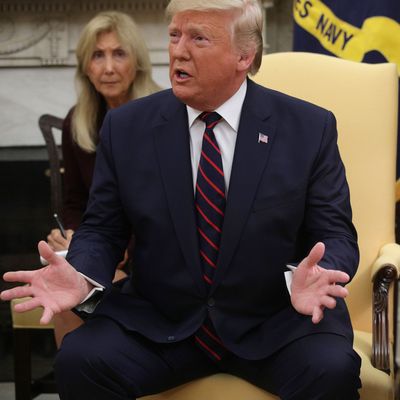
Donald Trump would like you to know that the Kurdish forces his own administration paid to fight ISIS were actually “more of a terrorist threat, in many ways, than ISIS” all along.
The president made this absurd (and, if true, self-damning) assertion on Wednesday when speaking to reporters in the Oval Office. Since abruptly withdrawing troops from northeastern Syria this month and giving Turkey the green light to invade, Trump has faced a barrage of bipartisan criticism. Shortly after the president’s remarks, an overwhelming majority in the House voted to condemn his new Syria policy. This climate of dissent — so widespread even Trump’s most resolute toadies have gotten in on the act — put the president in a manically defensive mood.
In the Oval Office, Trump first availed himself of a banal “America first” line of defense.
“If Turkey goes into Syria, that’s between Turkey and Syria,” Trump explained. “It’s not between Turkey and the United States, like a lot of stupid people would like us to … would like you to believe.
“Our soldiers are not in harm’s way — as they shouldn’t be — as two countries fight over land that has nothing to do with us,” he continued. “And the Kurds are much safer right now.”
This characterization of the conflict is a bit dubious. It’s certainly true that the U.S. has no strong national interest in who governs northeastern Syria. But circumstances in that region don’t have “nothing to do with us.” The Syrian Kurds took on massive casualties on our nation’s behalf when we enlisted them to fight the theocratic death cult that our invasion of Iraq helped spawn. The Kurds made those sacrifices on the understanding that the U.S. government would not abruptly allow them to be slaughtered. That Trump has betrayed that expectation could adversely impact our government’s ability to outsource world-policing to other “moderate rebels” in the future (which, granted, might be for the best). Regardless, it is obviously not the case that the “Kurds are much safer now” than they were when a small deployment of U.S. forces was keeping the Turkish army at bay.
And then, Trump took his self-defense to a wild — and wildly counterproductive — level.
“But the Kurds know how to fight,” Trump continued. “And, as I said, they’re not angels. They’re not angels, if you take a look … The PKK, which is a part of the Kurds … is probably worse at terror, more of a terrorist threat in many ways, than ISIS.”
Here, the president is within a 500-mile radius of a point. Much U.S. coverage of the present conflict has elided the fact that Turkey’s security concerns aren’t baseless. The Kurdistan Workers’ Party (PKK) has been waging a violent separatist insurrection inside Turkey for decades. The PKK has targeted civilians, and the U.S. government has long considered it a terrorist organization. And the Kurdish militants we partnered with in Syria have deep ties to the PKK. Thus, it isn’t hard to see why the Turkish government would find the presence of an autonomous Kurdish state, run by a militia that is aligned with a separatist terrorist movement within its borders, intolerable. The fact that partnering with the Syrian Kurds would inevitably steer the U.S. into a conflict with a NATO ally — in a region where the U.S. has few interests and Turkey serious national-security ones — was clear when the Obama administration first chose to do so. This crisis is not entirely of Trump’s own making (even if he has handled it in the most destructive and inhuman way possible).
But the president wasn’t content to cite the PKK’s history of terrorism as a means of illustrating the complexity of the conflict he inherited. Instead, he opted to suggest that the secular Kurdish forces — whose animating mission is self-determination for their long-suffering ethnic group — are “in many ways worse” than a genocidal Islamist organization that aims at the destruction of all decent civilization.
Such a claim is not just ludicrous but self-indicting. After all, if it were actually the case that the PKK was more of a terror threat than ISIS, then Donald Trump would have presided over a policy of putting guns and money into the hands of the world’s worst terrorist group. Which seems considerably worse than merely withdrawing U.S. troops from Syria in a manner that risks freeing ISIS prisoners and betrays a U.S. ally.






























